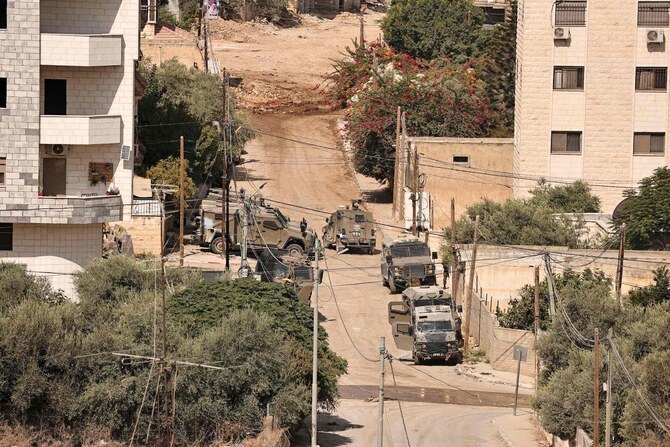LONDON: The number of Israeli settlement outposts in the occupied West Bank has surged in recent years, new analysis by the BBC has found.
There are now at least 196 outposts in the Palestinian territory, including farms, housing units and groups of caravans, with 29 established in the last year alone.
Despite being illegal under both Israeli and international law, outposts have been established using funding from organizations with close ties to the Israeli government.
Palestinians living near the outposts have suffered violent harassment and intimidation from settler communities, many of which employ armed militias with impunity.
The murky boundaries of the outposts often mean that their inhabitants come into contact with, and threaten, local Palestinians.
Ayesha Shtayyeh, a Palestinian grandmother, said she was held at gunpoint last October and told to leave the home that her family had owned for 50 years.
The settler who threatened her is believed to be Moshe Sharvit, who was sanctioned by the UK and US.
By using outposts, settlers are able to appropriate Palestinian land at a more rapid pace, the BBC found.
Analysis by the British broadcaster used data from Israeli anti-settlement groups and the Palestinian Authority, finding that almost half (89) of the 196 outposts had been established since 2019.
Azi Mizrahi, a former Israel Defense Forces commander in the area, admitted that outpost-building makes violence more likely.
“Whenever you put outposts illegally in the area, it brings tensions with the Palestinians … living in the same area,” he said.
Unlike settlements, outposts lack official Israeli planning approval, but authorities still turn a blind eye to them.
The UN’s top court in July ruled that Israel should end all settlement-building and withdraw settlers from the Occupied Territories.
Two organizations with close ties to the Israeli government were found by the BBC to have financed the establishment of new West Bank outposts.
The ties between the World Zionist Organization, Amana and the government reveal the deliberate nature of Israel’s land grabs in the West Bank.
The WZO, established more than a century ago, employs a “settlement division” that is financed entirely by Israeli public funding.
That division handles contracts and land allocations in the Occupied Territories, and has granted settlers the freedom to build new outposts on appropriated land.
Amana, a key settler organization, loaned settlers hundreds of thousands of shekels to build new outposts in the West Bank.
Both organizations used farming or grazing land categories as cover to support secret outpost-building, the BBC found.
Amana CEO Ze’ev Hever was secretly recorded in 2021 as saying: “In the last three years … one operation we have expanded is the herding farm (outposts). Today, the area (they control) is almost twice the size of built settlements.”
Another tactic employed by the government is to retroactively classify outposts as legal. Last year, authorities began legalizing 10 outposts and granted at least six others full legal status.
Moayad Shaaban, the chief of the PA’s Colonization and Wall Resistance Commission, said: “It reaches a point where Palestinians don’t have anything anymore. They can’t eat, they can’t graze, can’t get water.”
The UN Office for the Coordination of Humanitarian Affairs warned that settler violence in the West Bank has reached “unprecedented levels.”
OCHA recorded more than 1,100 settler attacks against Palestinians in the past 10 months alone. Those attacks led to the deaths of 10 Palestinians and injuries to 230.


























